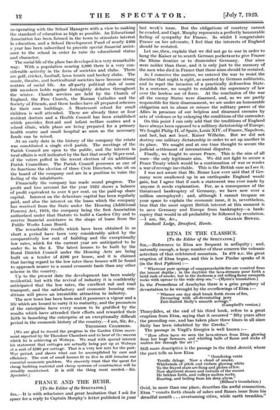FRANCE AND THE RUHR.
[To the Editor of the SPECTATOR.] S1R,—It is with reluctance and great hesitation that I ask for space for a reply to Captain Murphy's letter published in your
last week's issue. But the obligations of courtesy cannot be evaded, and Capt. Murphy represents a perfectly honourable feeling of sympathy for France. So whilst I congratulate
France on her advocate, I feel that the interests of England should be restated.
Let me,then, explain that we did not go to war in order to hang the Kaiser or to search German pockets or to give France' the Rhine frontier or to dismember Germany. Our aims were nobler than these, and it is only just to the memory of the men who died in France that those aims should be restated.
As I conceive the matter, we entered the war to resist the doctrine that might is right, as asserted by German militarists, and to repel the invasion of a practically defenceless State. In a sentence, we sought to establish the supremacy of law over the lawless use of force. At the conclusion of the war all the enemy States were disarmed, and, as we are partly responsible for their disarmament, we are under an honourable obligation not to abuse or misuse the military power of the Allies in presence of our helpless and disarmed enemies by acts of violence or by enlarging the conditions of the surrender.
On this point I can only add that the traditions of England have always been opposed to a military dictatorship of Europe. We fought Philip II. of Spain, Louis XIV. of France, Napoleon, and last, but not least, Kaiser Wilhelm. But we did not destroy one military dictatorship in order to set up another in its place. We sought and at one time thought to secure the judicial settlement of international disputes.
Finally, we fought to secure Peace. This is the aim of all wars—the only legitimate aim. We did not fight to secure a Peace Treaty which would be a continuation of war or render
a war of revenge inevitable. This is the British case as I see it.
I was not aware that Mr. Bonar Law ever said that if Ger- many were swallowed up in an earthquake England would gain, but I agree that if such a statement was ever made by anyone it needs explanation. For, as a consequence of the threatened bankruptcy of Germany, we have now over a million unemployed ; and, although I cannot trespass on your space to explain the economic issue, it is, nevertheless, true that the most urgent British interest at this moment is to save Germany and Europe from bankruptcy—a bank- ruptcy that would in all probability be followed by revolution.
—I am, Sir, &c., Gamiest BOWER.
Studwell Lodge, Droxford, Hants.














































 Previous page
Previous page